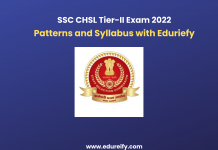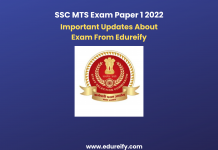The Joint Entrance Examination is the most important exam for all students in India who wish to secure a seat in the prestigious IITs and NITs. Lakhs of students write them each year, but only a small fraction of them land up in the college of their dreams. Read on to find out more about the syllabus, important dates, and how you can study to fare well in this all-important examination.
India produces a large number of engineers every year, with about 24,00,000 people predicted to graduate between 2020 and 2021. This number has only been increasing over the past decade, and has recently, nearly doubled.
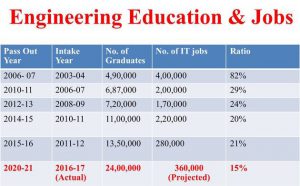
With the stark competition for engineering jobs in our country, most people aspire to get into premier institutions like the Indian Institutes of Technology or National Institutions of Technology. This can be done by clearing the Joint Entrance Examination (JEE), where seats are offered according to the rank one has procured in the exam.
JEE has 2 stages, Mains and Advanced. JEE Mains is the first round of examinations, which is now being conducted multiple times a year. In 2019, JEE Mains was conducted in 2 batches, viz. between 8th-12th January, and then between 8th-12th April. Clearing JEE Mains qualifies you to write JEE Advanced, which, if cleared, qualifies you for a seat in an IIT.
Here is a comparison between the two exams:
|
JEE MAINS |
JEE ADVANCED |
|
|
No. of papers |
1 |
2 |
|
Total marks |
360 |
Varies each year |
|
Marking scheme |
+4, -1 |
Varies each year |
|
Institutions that consider the ranks for this examination |
NITs DTU Select private colleges |
IITs |
Important dates for JEE Advanced 2019:
Admit card release: 20-27 May 2019
JEE Advanced Exam: 27 May 2019
SYLLABUS
Both exams have only three subjects that are being tested: Physics, Chemistry, and Math. The syllabus of JEE Mains and Advanced, though widely regarded as being based on the CBSE
syllabus for 11th and 12th grade, is very different in terms of how in-depth one must study, the chapters that will actually appear in both exams, as well as the weightage for each chapter. As such, preparing for these exams requires that the syllabus is first examined and then divided into parts based on its importance.
Let us look at the division of the syllabus for JEE Advanced based on predictions from past years’ papers:
PHYSICS:

Let us go through the breakdown of each domain in order of weightage:
1. ELECTRICITY AND MAGNETISM

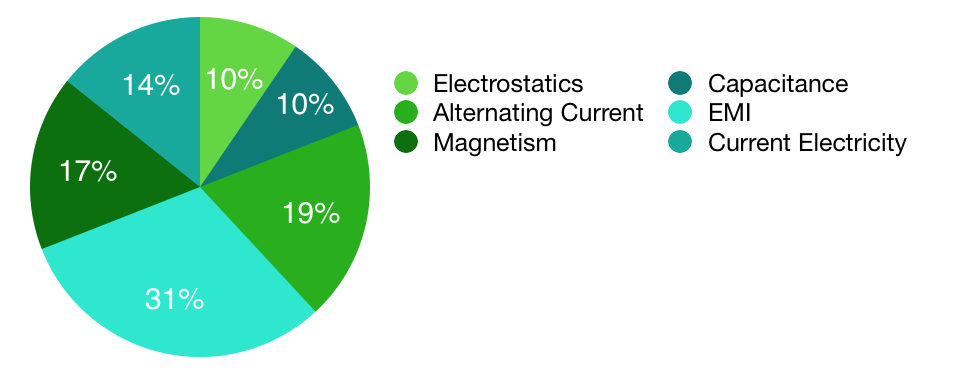 Electro Magnetic Induction and Alternating Current are not only new topics introduced in 11th-12th of CBSE, but also filled with numerical questions. Electrostatics, however, is considered very tricky despite having a lower weightage.
Electro Magnetic Induction and Alternating Current are not only new topics introduced in 11th-12th of CBSE, but also filled with numerical questions. Electrostatics, however, is considered very tricky despite having a lower weightage.
2. MECHANICS:
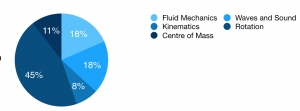
Mechanics has always been considered one of the most important JEE topics for physics, with Rotational Dynamics being the topic with the highest weightage. Rotation is also considered the toughest of the Physics chapters by most people, hence it is important to focus on this topic. Kinematics is usually given lesser weightage since it is not a new topic (having been introduced in 9th itself in most school boards).
3. THERMAL PHYSICS, OPTICS, MODERN PHYSICS, GENERAL PHYSICS

Within Optics itself, Wave Optics is a newer topic as compared to Ray Optics (having previously been introduced in 10th), and is thus likely to have more weightage. Modern Physics has the most weightage in this category.
CHEMISTRY

Chemistry has 3 facets: Organic, Inorganic, and Physical chemistry, which now get more or less the same weightage in the JEE Advanced papers. Previously, Inorganic used to have the most weightage, but things have changed, so be sure not to leave out preparations for any of the chapters!
1. Inorganic Chemistry
The most important chapters are p-block elements, d-block elements, and hydrogen (in order of importance), which are quite voluminous.
2.Organic Chemistry
The most important chapters are Alcohols, Phenols, Ethers, Hydrocarbons, Aldehydes and Ketones, with special stress on Elements Containing Nitrogen. Organic is often the trickiest of the chemistry section, so please spend extra time on this.
3. Physical Chemistry
Important chapters are Thermodynamics, Surface Chemistry, Chemical Kinetics, and Chemical Equilibrium.
Note: The above-mentioned chapters are all important, but they are not the only chapters in Chemistry, so be sure to finish these first and then tackle as many chapters as possible thoroughly.
MATHEMATICS

Mathematics is often considered the toughest subject of all across JEE Mains and Advanced. Special attention is to be given to 3D Geometry, Analytical Geometry, Permutations and Combinations, as well as Integral Calculus. These chapters are voluminous, complex, and are usually considered difficult. This is more or less a broad prediction that cannot be broken down chapter-wise.
MARKING SCHEME FOR JEE ADVANCED:
Unlike JEE Mains, where every right answer gains you 4 marks and every wrong answer makes you lose 1 mark (i.e +4, -1 scheme- negative marking), JEE Advanced has no set pattern when it comes to either the type of question or the marking scheme.
TYPES OF QUESTIONS:
- Single choice: MCQs where only one of the options is correct. (All JEE Mains questions are MCQs only, but not in JEE Advanced)
- Multi-choice: MCQs where one or more options are correct.
- Matrix questions: Akin to match the following questions, where options indicate matched sets, of which any one set may be right.
- Integer answers: Questions where the answer is an integer, and the given integer has to be entered.
Even though is a broad classification, there are many ways the marking scheme could go. Each Advanced paper has multiple sections, each of which has its own marking scheme. These sections, number of questions, total marks, and marking schemes are all revised each year for JEE Advanced, hence there is no concrete way to predict the actual marking schemes of these papers.
However, here is a breakdown of JEE Advanced 2018’s questions, indicating the types of questions found.
HOW TO PREPARE:
Analyse the syllabus:
Know the tentative dates of your examination, and analyse the syllabus to see which chapters you can complete within the given timeframe. Break these down into relevant topics.
Set an exam schedule:
Set up a timetable post the analysis of the syllabus, and make sure to include as many important chapters as possible to be thorough in, before the exam. If you do have time, include every single chapter, as JEE Advanced can surprise you.
Get extra help:
Studying for an exam as prestigious as JEE alone is very difficult. In order to get some expert advice, question papers, mock exams, and overall assistance, join an online coaching platform. A popular one is Edureify. Edureify provides a topic-wise set of questions that are tailored to the exam you choose to appear for. The platform also has a dedicated set of teachers who specialise in each subject, so you can request to be tutored by them to improve your performance.
Edureify solving sets are designed in levels of increasing difficulty designed to test your preparation. In addition to this, be sure to participate in the game-quizzes and AIR challenges that are full of higher-order-thinking questions, mirroring the real JEE examination. Edureify even allows you to test yourself based on various parameters: Concept Analysis, and Speed Analysis. Both are important to succeed in a test like JEE.
The recommendation is to get your Concept Analysis to a level you’re happy with, and then Speed Analysis- do not forget that JEE has negative marking, so strong concepts triumph over the speed of solving.
FEW IMPORTANT TIPS:
- Do not use your mobile phone/laptop/TV/iPod, etc while studying, as it can cause major distractions.
- Get a good night’s rest the day before the exam, and try not to study anything new 24 hours prior to the exam- just revise what you already know to strengthen your concepts.
- Reach the exam venue at least 1 hour prior to exam start time just in case there may be traffic or any other logistical issues. DO NOT ARRIVE LATE UNDER ANY CIRCUMSTANCES.
- Try to be cool and calm during the test- it is just another exam, and you can make mistakes in your tense state.
- If you do not know the answer, do not guess unless there is no negative marking for the particular section you are attempting.
If you keep all these points in mind and prepare ahead of time, you are sure to do wonderfully well in your exam. Remember, you can accomplish any goal with hard work and perseverance. Good luck to all JEE aspirants!
Master Your Coding Skills with BootSelf AI
If you're looking to enhance your coding abilities and upskill in artificial intelligence, look no further than the BootSelf AI app. This innovative platform provides AI-based coding lessons that are tailored to your individual learning pace.
Available on both iOS and Android, you can download the BootSelf AI app and start mastering coding skills today:


